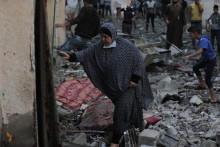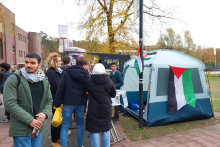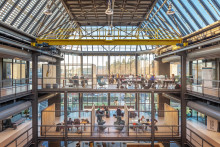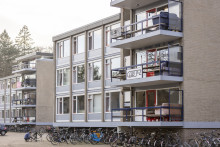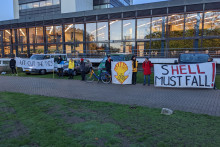‘You could describe the current situation in Gaza as the perfect storm,’ says Juliane Schillinger, whose research focuses on the impacts of armed conflict on local water management systems in the Middle East. ‘Absolutely everything is coming together and leading to an extreme level of human suffering,’ adds the PhD researcher at the UT’s Faculty of Behavioural, Management and Social Sciences (BMS).
‘It is definitely a unique situation,’ says Schillinger. ‘We are talking about an area with enormous historical baggage marked by occupation and conflicts, an area where water systems were already dysfunctional before the war started. On top of that, the past month has brought intense bombardments and ground attacks. We must remember that the Gaza strip is very densely populated and built up. You cannot attack one piece of infrastructure without damaging everything else around it. Most major water infrastructure has most likely been damaged by now. The intensity of this situation is something we haven’t seen before.’
Infrastructure in disrepair
As the UT expert explains, water systems in Gaza were already in a terrible state before the current war. ‘Firstly, even the best infrastructure could not fix the water resources problems there. About 95% to 97% of ground water in Gaza is not suitable for human consumption,’ says Schillinger. ‘Secondly, it has been close to impossible to develop and maintain water infrastructure in Gaza. Because of the blockade, there is a very strict list - known as the dual-use list – that determines what is allowed to be imported. It essentially forbids most relevant materials from being brought into Gaza, and it is very difficult to build or repair anything without pipes and other equipment.’
'It has been close to impossible to develop and maintain water infrastructure in Gaza’
Could the current situation have been partly prevented if the water infrastructure in Gaza was in better condition? ‘The issue is that Israel is purposefully targeting infrastructure. Not only now, but also in the past,’ says Gül Özerol, Associate Professor at the Section of Governance and Technology for Sustainability (BMS faculty). ‘The ongoing conflict is about occupation and oppression by Israel. It’s about control – including control of resources. Water naturally plays a big role in that.’
(Text continues below the photo.)

That makes it very hard to make any progress in terms of new or improved infrastructure, adds Özerol. ‘There are desalination plants and wastewater treatment plants in Gaza, but once again, there is neither the energy nor the capacity to maintain this infrastructure and keep it operational. There are people in Gaza who have the knowledge and expertise to improve it, but they have no access to or control over resources due to the siege. Because of this, the local infrastructure has fallen into disrepair.’
Water trucks
Due to the devastating state of water infrastructure in the Gaza strip, the UT scientists urge for water to be brought through humanitarian transport. ‘Roads and pipes have been destroyed, whole neighborhoods have been wiped out. Repairing the water systems will not be possible anytime soon. The only solution right now is to allow water trucks in,’ says Özerol. ‘Gaza is unlivable when it comes to water and other basic resources.’
'The impact on public health will be enormous’
‘Quick help is needed,’ agrees Schillinger. ‘We need to bring water and hygiene kits, such as equipment to treat polluted water – because the water that is there is not safe to drink. We need to do this fast because water impacts everything else. The impact on public health will be enormous. That is the big issue here. Just think of waterborne diseases that will spread, children who will suffer malnutrition and bear the consequences for the rest of their lives. Many more people will die due to water related issues over the next weeks and months.’
Colleagues in Gaza
The UT scientists have been struggling – because of their limited capacity to help and because of their academic connections in Palestine. ‘Is there anything academics can do to help? That is the big question we have been asking ourselves,’ says Schillinger. ‘We still lack understanding of long-term effects of armed conflicts on water infrastructure. If we had this, we could perhaps take precautions – and that is something we can contribute to with our research. But the big problem is the disregard for international humanitarian laws. We have witnessed very questionable attacks over the past month, and the lack of response from our leaders has been shocking for me. This makes you question how useful your work really is. I’m struggling with that.’
'They are people like us’
‘On the more human level, the best we can do as academics is to speak up and do interviews such as this one,’ adds Schillinger. ‘We have colleagues in Gaza, and we don’t know if they are dead or alive. We need to highlight the human component of this conflict. They are people like us.’
Gül Özerol, who has collaborated with six universities in Palestine, including the Islamic University of Gaza as part of the PADUCO programme (Palestinian-Dutch academic cooperation on water), feels similarly: ‘I was always amazed with how active and resilient the colleagues from Gaza were. What we, as academics, can do is keep collaborating with our Palestinian colleagues and raise awareness about their suffering. At this point, I think we should take sides. We can no longer be naively objective.’


